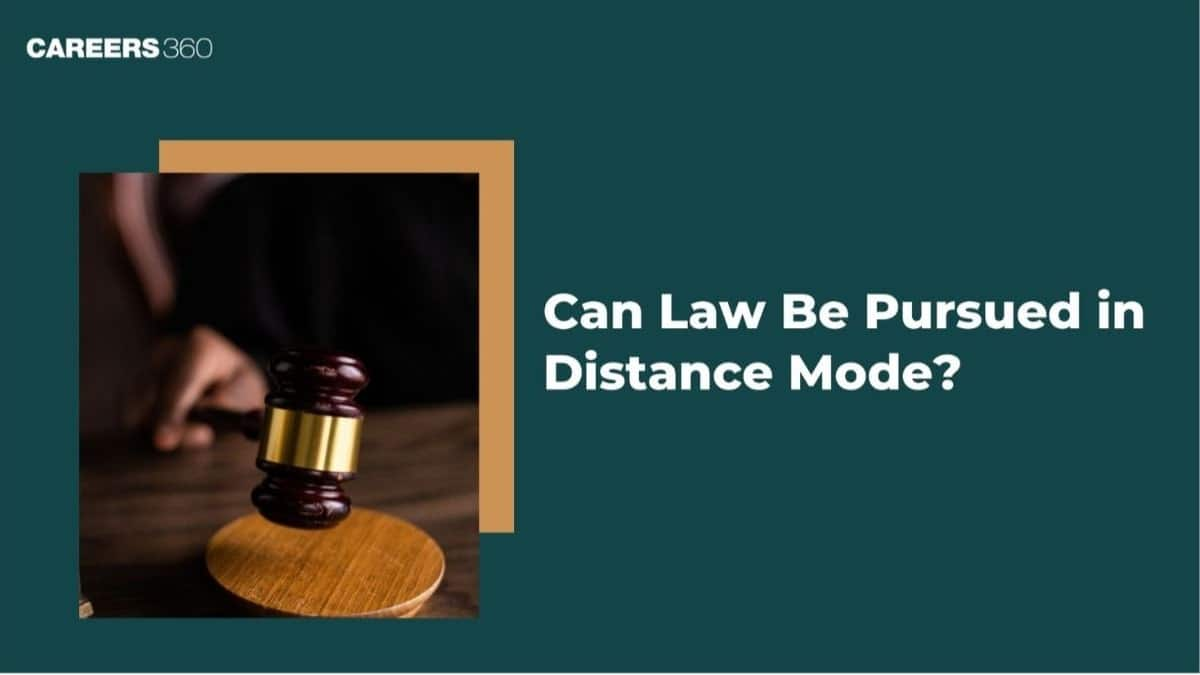Keep both CLAT and AILET options open to maximize your chances.
SPJIMR Mumbai PGDM Admissions 2026
Ranked No. 3 Business School in India and no.35 in world by Financial Times MiM 2025 Ranking | Highest CTC: INR 89 LPA
Law is one of the most respected professions and sought-after fields in the world. After graduating with a law degree from a recognised university, students can opt for various careers such as a lawyer, legal advisor, or judge. However, due to its high demand, many students may wonder whether it is possible to pursue a law degree through distance or correspondence mode. While distance learning is gaining popularity in recent times, students must understand a few things about pursuing law through distance mode.

Various law courses are offered in India, however not all the courses are recognised by the BCI as being equivalent to a law degree. Some of the courses offered in law are mentioned below.
UG Courses in Law
PG Courses in Law
According to the circular released by BCI, it does not recognise MA Law as equivalent to a LLM (Legum Magister). LLM degree is specifically created for law students, while an MA consists of broader academic subjects and is considered separate from an LLM degree.
For admissions, students need to appear for relevant entrance examinations. CLAT, SLAT, and AILET are the popular entrance examinations. Many universities also conduct university-level entrance examinations. In the table below, we have provided the exam details.
| Exam Name | Conducting Body | Exam Schedule |
|---|---|---|
Consortium of NLUs | ||
National Law University, Delhi | ||
Symbiosis Law Admission Test | ||
Directorate of Higher Education Mumbai |
Law as a career is regulated by the Bar Council of India (BCI). It governs legal education and law practice. According to BCI, it does not recognise any law degree pursued through online, distance, correspondence, open or distance mode. It mandates that law education should include classroom lectures, moot court and practice.
While distance or correspondence mode may sound intriguing to law aspirants, legal education requires practical training and moot court practice. All these requirements cannot be met successfully through distance mode. To practise law in India, students need to pass the All India Bar Examination (AIBE).
To conclude, legal education cannot be attained through open and distance learning (ODL mode). To pursue a Law degree, students must have an LLB or LLM degree from a recognised institute in India and successfully clear the All India Bar Examination (AIBE) examination.
On Question asked by student community
Hello,
You can get the Karnataka State Law university (KSLU) 3 year LLb sem question and answers pdf through the link i attached below. It will help you to understand the exam pattern and enhance your exam preparation. The pdf is available for free.
Here is the link: https://law.careers360.com/articles/kslu-question-paper
https://www.ksluonline.com/
Hello,
If you are from Delhi and appearing for CLAT, then you come under the General (All India) category, as CLAT reservation is based on the domicile of NLUs, and Delhi does not have a National Law University under CLAT (NLU Delhi conducts AILET separately).So, you can apply for CLAT through All India Quota, and if you don’t get a seat in NLUs. You can apply through CLAT, AILET, or private law colleges like Amity, Symbiosis, or IPU for admission.
Keep both CLAT and AILET options open to maximize your chances.
Hope you understand.
Hello,
Yes, you are eligible for MH CET Law 2026 (3-year LLB) as you’ve completed your BCom in 2025. The basic eligibility requires a bachelor’s degree with at least 45% marks (40% for reserved categories) from a recognized university.
You can apply online through the official CET Cell Maharashtra website when the registration opens, usually between January to March 2026. The exam will test your legal aptitude, reasoning, English, and general awareness.
Hope you understand.
Hi,
According to your rank, securing a seat in the Government college in SC category can be challenging as the cutoff goes quite high. For 2025 admission the cutoff for SC category was 97.70% and the corresponding cutoff was around 99.5%. Your rank of 527 is much lower than this cutoff, meaning the admission can be quite difficult.
You can go for alternative options for other law colleges which will accept VUET score and have more accessible cutoff for SC category.
Hope it helps!!!
Hello,
No, most 5-year LLB entrance exams do not have negative marking. Exams like TS LAWCET,AP LAWCET and MH CET Law do not include negative marking. For each correct answer, you will get one mark, and there is no penalty for wrong answers. So you can attempt all the questions confidently and prepare well.
For more details follow the link: https://law.careers360.com/articles/ap-lawcet-exam-pattern
Ranked #18 amongst Institutions in India by NIRF | Ranked #1 in India for Academic Reputation by QS Rankings | 16 LPA Highest CTC
NAAC A++ Approved | Curriculum Aligned with BCI & UGC
Grade 'A+' accredited by NAAC | Ranked 33rd by NIRF 2025
Admissions Open | Globally Recognized by AACSB (US) & AMBA (UK) | 17.8 LPA Avg. CTC for PGPM 2025
#36 in NIRF, NAAC ‘A’ Grade | 100% Placement, up to 30% meritorious scholarships
Ranked #45 Among Universities in India by NIRF | 1950+ Students Placed, 91% Placement, 800+ Recruiters